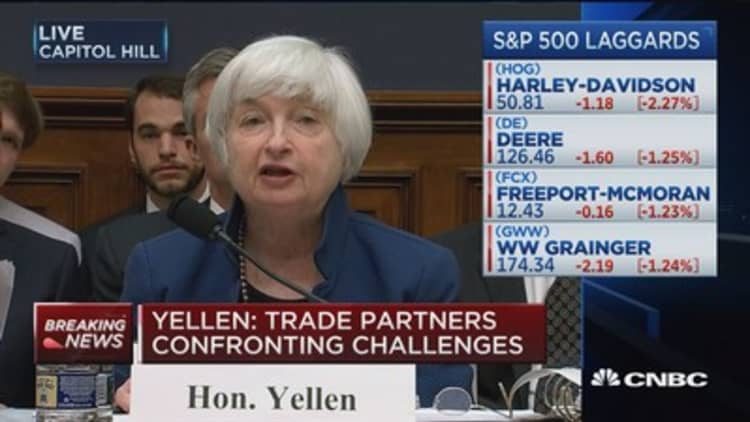The dollar eased against the yen on Wednesday, after Federal Reserve Chair Janet Yellen said interest rates hikes would be gradual and that the U.S. central bank may not be able to raise rates by "all that much."
In what may be one of her last appearances before Congress as Fed chair, Yellen said the U.S. economy remains strong enough for the Fed to continue its plans to gradually tighten policy, though relatively low inflation and a low neutral rate may leave the central bank with diminished leeway.
"Yellen highlighted inflation uncertainty at a time when the doves of the board have increasingly started questioning about possibly stalling the tightening process until inflation is closer to target," said Paresh Upadhyaya, portfolio manager at Amundi Pioneer in Boston.
Yellen also noted that given current estimates, the federal funds rate "would not have to rise all that much further" to reach a neutral level that neither encourages nor discourages economic activity.
The Fed still feels the economy needs loose - or accommodative - monetary policy, so a lower neutral rate may mean fewer rate hikes.
"The comment was very dovish. She implied the Fed may be close to the end of tightening, which was the first time we actually heard it from her," said Upadhyaya.
The dollar index, which tracks the greenback against six major rivals, was up 0.10 percent to 95.77, after falling to 95.511, its lowest since June 30.
Against the yen, the was 0.07 percent higher at 113.21 yen following a decline in short-term U.S. interest rates after Yellen's testimony.

The dollar, which fell against the euro soon after the release of the remarks, reversed course and was trading near session highs against the European common currency.
The Canadian dollar rose to a more than one-year high against its U.S. counterpart after the Bank of Canada raised interest rates for the first time in nearly seven years, saying the economy no longer needed as much stimulus.
In Britain, slightly-better-than-expected wages and jobs data saved the pound from another downward lurch on Wednesday, offsetting a series of political and economic warning signs as talks on leaving the European Union get going in earnest.
Brazil's real rose to a near-eight-week high against the greenback after former President Luiz Inácio Lula da Silva was convicted of corruption charges, reducing traders' fears that he could return to office next year to challenge the pro-business agenda of incumbent President Michel Temer.

